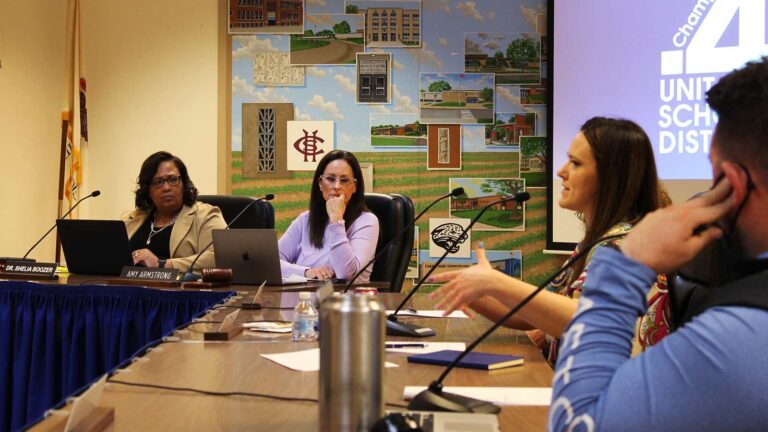CHAMPAIGN — The Unit 4 school board hired a consulting firm to figure out how to further desegregate its schools.
But after months of parent pushback, both the company and the district superintendent are recommending keeping the current schools of choice system, with some tweaks.
David Sturtz is an executive director at Cooperative Strategies, the company hired by the district. He says his firm doesn’t recommend trying more dramatic changes anytime soon.
“We heard resoundingly that [moving the majority of students] was undesirable — and it wasn’t resounding from one community and not others. We heard it everywhere we went,” Sturtz said.
The Champaign Unit 4 Board of Education will vote on what to do on January 23.
This recommendation would move less than 10 percent of students to different schools – instead of more than two-thirds.
In Cooperative Strategies’ final proposal, less than 10 percent of students would change schools.
Cooperative Strategies was weighing this against a cluster model, where each family could choose from four schools instead of 12. That option would move 64 percent of students and proved unpopular in surveys.
The benefit – it would provide more integration within each cluster. It would also make transportation more efficient because children within each neighborhood would be going to the same four schools.
“I really liked scenario of the cluster model. But because of the pandemic, and the disruption involved, this is not the time to do something like that, as it’s just not fair to our students,” said Unit 4 Superintendent Shelia Boozer.
Many parents have made similar arguments while lobbying the school board and protesting at meetings in recent months.
Cooperative Strategies heard that feedback and proposed a less disruptive model in December. After conducting another survey with parents about these options, the least disruptive model won out.
In the final model, the families of kindergarteners would still rank their top choices out of 12 elementary schools. The algorithm would still sort them by their choices, proximity to their schools and socioeconomic balance at the school.
There would be some small changes to the process to allow late registrants to choose schools as well.
The biggest changes would happen at individual schools. Both Garden Hills Academy and International Prep Academy would teach pre-kindergarten through eighth grade.
Some elementary schools would start feeding into different middle schools than they currently do. However, siblings will be grandfathered into the system. As long as they have an older sibling still in middle school, they can opt into the same middle school as their sibling.
The most controversial change in the new proposal is that Kenwood Elementary School and Barkstall Elementary School would lose their year-round school or “balanced” calendars. Cooperative Strategies is recommending this so late registrants can join the two schools.
Both teachers and parents from the two elementary schools have expressed opposition to this change, saying the balanced calendar offers necessary mental health breaks throughout the year and prevents learning loss.
Emily Hays is a reporter for Illinois Public Media. Follow her on Twitter @amihatt.

